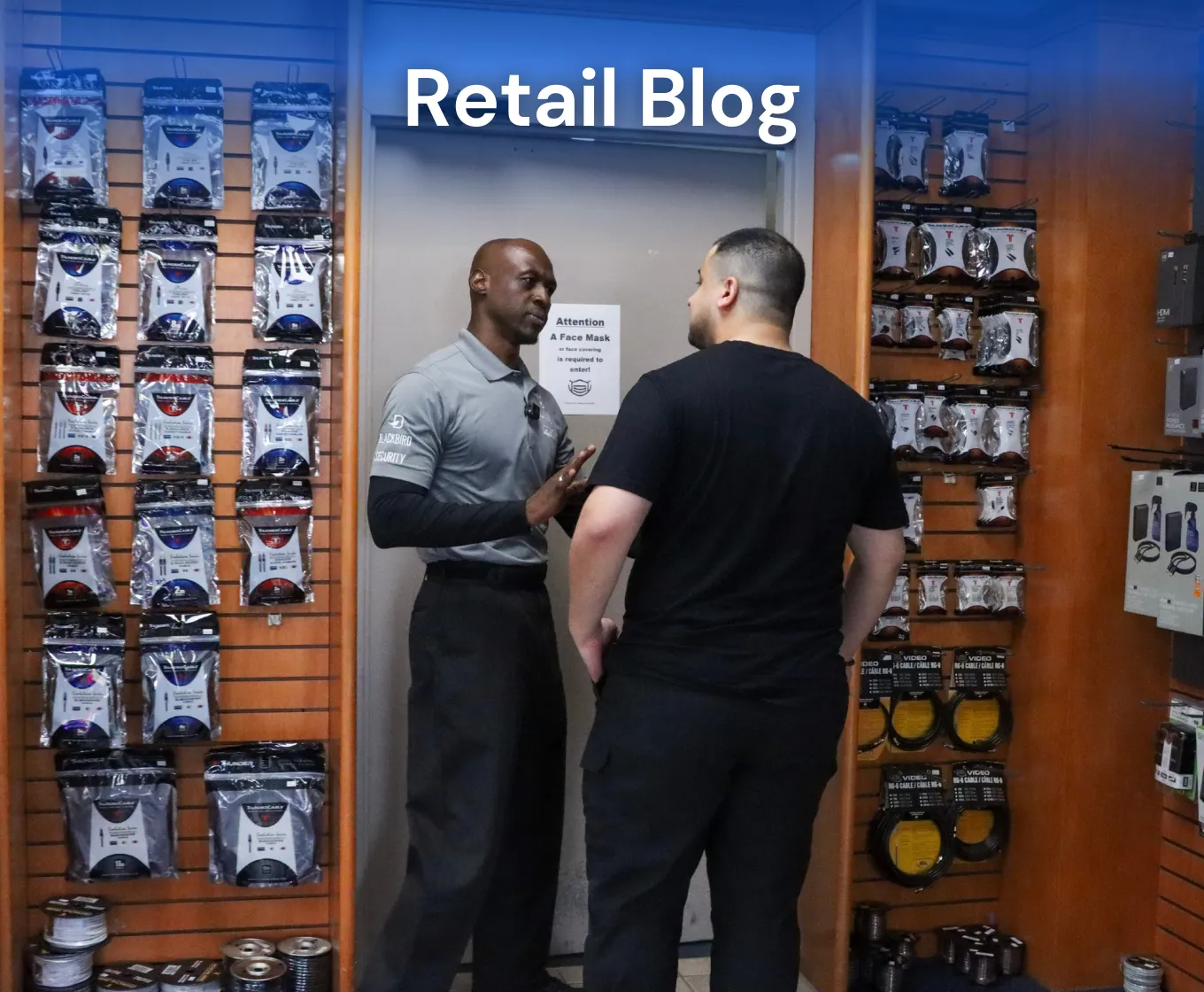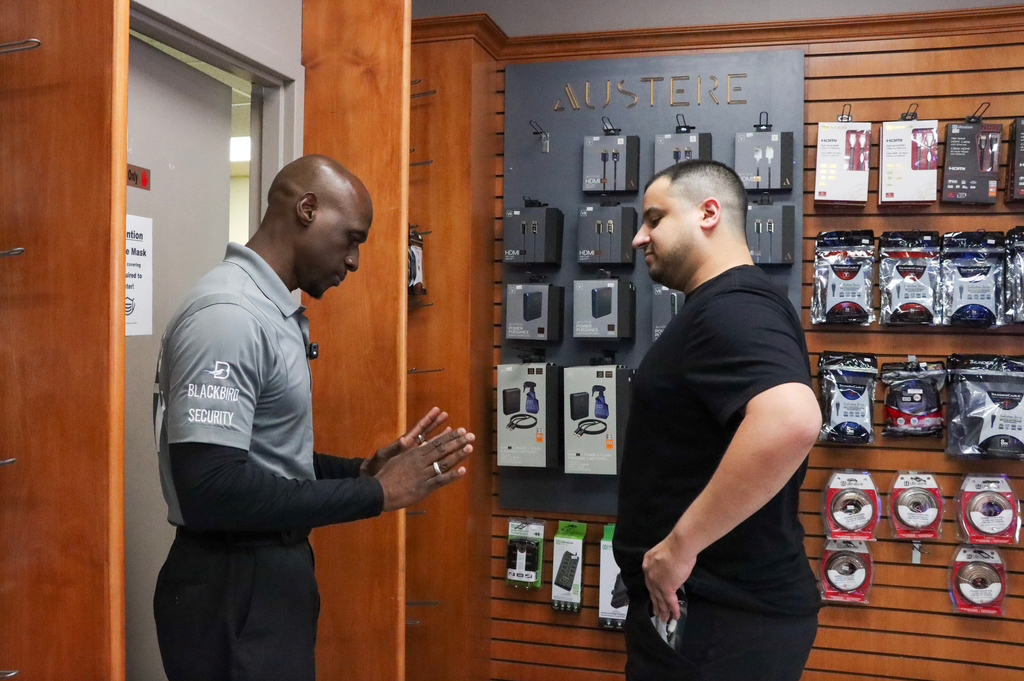Back
Back

Retail security and loss prevention help prevent shoplifting in different ways: retail security guards protect overall store safety, while loss prevention operatives (LPOs) prevent theft and shrinkage. Combined, they provide a highly effective means of protecting a store against shoplifting. If you’re a store owner or manager and curious to learn more about how security can help prevent shoplifting, this article will help you understand how retail security and loss prevention minimize theft.
Retail theft is on the rise in Canada, with violence becoming an increasingly common theme across incidents of theft.
Retail security guards serve as a customer-facing security measure, visually deterring potential thieves and helping maintain a safe shopping environment.
LPOs often operate undercover, with a greater focus on preventing theft and shrinkage than retail security guards do.
Together, retail security guards and LPOs provide the most comprehensive coverage for stores.

Retail theft is a problem affecting millions of retailers across Canada. If you’re a store owner or manager yourself, chances are that you have more than one story about shoplifting from your location. The Retail Council of Canada reports that shoplifting costs retailers $9 billion annually, with repeat offenders causing a particular problem.
Not only is this a highly expensive issue, but it’s also a threat to safety. 76.2% of retailers report an increase in violent incidents during thefts. Violence within stores negatively affects staff morale and can have devastating consequences for a brand’s image when customers are put in harm’s way.
As a result of these factors, more retailers are turning to retail security to safeguard their stores, inventory, customers, and employees.
Retail security encompasses all measures that protect a store’s customers, staff, and inventory, while loss prevention focuses specifically on preventing theft and shrinkage. You can think of retail security as the umbrella that encompasses every element of a store’s protection strategy, including CCTV cameras, anti-theft tags, and loss prevention operatives (LPOs).
Here are the general differences between retail security guards and LPOs:
Retail security guards serve a customer-facing role in stores, focusing on overall store safety. These guards are stationed at store entrances, watching for suspicious behaviour, aggression, individuals under the influence, and any other threats to store safety.
A tactical security guard is a type of retail security personnel who is trained in the use of force, handcuffs, and batons to address serious safety threats. These guards provide a strong element of deterrence against shoplifters and bad actors, thanks to their distinctive tactical vests.
The role of a loss prevention operative (LPO) is to prevent theft and shrinkage. These specialists typically wear ordinary clothing to blend in with customers, enabling them to observe customer activity directly on the store floor without raising suspicion. From their uniquely close perspective, LPOs use discrete monitoring methods to watch for signs of shoplifting.
Unlike standard and tactical retail security guards, LPOs aren’t as focused on store safety. Since LPOs work undercover, directly addressing non-theft-related safety concerns within the store could reveal their identities as loss prevention, thereby reducing their effectiveness.
Learn more about the duties of loss prevention guards in our previous blog, What Are the Duties of a Loss Prevention Security Guard?.
Working together, both retail security guards and LPOs provide complete coverage to proactively prevent and address shoplifting. Next, we’ll detail exactly how each role achieves this shared goal.

Retail security guards use their visibility to customers to their advantage when preventing shoplifting. Here’s how:
Standard security guards wear uniforms that clearly identify them as security personnel, providing a strong visual deterrent against casual shoplifters. The presence of a security guard at a store entrance communicates to potential thieves and other bad actors that the store is well-protected, thereby reducing the likelihood of theft.
As guards stationed at store entrances will be the first to spot any suspicious individuals who enter a store, they will alert LPOs to their presence over a radio system. From there, LPOs will discreetly monitor their behaviour and take action if needed.
Guards also monitor the store floor through patrols, particularly in areas housing high-value merchandise, such as electronics or jewelry. Similar to guards stationed at a store’s entrance, the presence of guards visibly monitoring these key areas deters theft.
Retail security guards will respond to all safety and security concerns, whether that’s a medical emergency or a theft in progress. If an LPO witnesses a customer shoplifting, security guards will support the LPO in confronting the individual, escorting them to the back of the store for incident recording, and, if needed, preventing the thief from escaping.
Compared to LPOs, security guards serve a more holistic role within a retail environment. They support store staff with several key tasks, including:
Answering customer questions
Checking receipts and bags when needed
Crowd and line-up management
Peaceful de-escalation and conflict resolution
Incident reporting
In the next section, we’ll cover how LPOs prevent and respond to shoplifting.
Since LPOs are more focused on preventing theft than maintaining store safety, their role differs slightly from that of retail security guards.
In addition to wearing plain clothing, an LPO will often wear a baseball cap to conceal their face. This conceals their identity, making it harder for customers to recognize them as LPOs, while also concealing their gaze, allowing them to monitor customers without fully giving themselves away.
LPOs will watch for actions like:
Repeatedly glancing at CCTV cameras
Swapping peel-off price tags
Placing items in personal bags
Pocketing small items
If an LPO witnesses a theft, they will confront the thief directly with the help of other retail security guards. The thief will then be escorted to a secure holding area where the retail security team will recover the stolen merchandise, photograph the thief for store records, issue a store ban, and may contact law enforcement if the value of the theft is high enough.
Depending on the security company they work for, LPOs typically maintain strong relationships with law enforcement. As LPOs are the ones who typically witness crimes firsthand, their statements are valuable to law enforcement and store managers when pressing charges against repeat or high-volume offenders.
Not only are the identities of a store’s LPO personnel hidden from customers, but they’re also concealed from store employees. This enables LPOs to discreetly monitor store staff for internal theft, collect evidence, and present findings to store managers. This is a highly effective way to deter internal theft committed by unsuspecting employees.

Retail security guards and LPOs work together to effectively prevent shoplifting in different ways. Without one, the other is less effective.
Let’s say your store relies solely on loss prevention. While you’ll prevent shoplifting, your customers and staff will be vulnerable to safety incidents. On the other hand, if your store only uses security guards, you’ll miss opportunities provided by undercover LPOs to catch thieves in the act.
When stores combine loss prevention and retail security services, they experience significantly reduced shrinkage and the best outcomes in preventing shoplifting.
With the right retail security and loss prevention strategies, shoplifting can be prevented. At Blackbird Security, we’ve seen firsthand how an investment in on-site security guards significantly reduces theft and shrinkage losses, improves customer experiences, and increases store safety. If you’re exploring retail security solutions, contact our team to learn how we can support your store.



